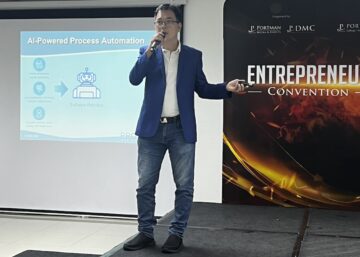
Having trained and consulted for more than 15 years across 10 countries, ET Khor has overseen and implemented many culture transformation projects that closed the gaps between employers and employees. ET sees the current Covid-19 outbreak is bringing another culture transformation of many companies. “There is a sudden increase in remote working practices. Some managers have seen the huge potential of remote working and they are planning to integrate it into their company culture,” said ET when he was interviewed on SME Innovation Stories #9. He believes remote working can serve as an effective talent strategy in the long run, where managers are no longer restricting their talent search in a small geographical region. This gives them better opportunities to find the best people for the company.
Thomas Cheah: More than a month ago, our government announced the Movement Control Order (MCO) where the employees of all companies were required to work from home (WFH). What are the major changes you have seen in the way teams and employees worked together during this period of time?
ET Khor: Everyone was forced to change, which I see this as a good thing. Previously, it is very hard to convince management to implement WFH policies. They are reluctant to invest in additional technologies such as remote meeting tools. So this situation had actually accelerated the digital transformation process as far as remote working is concerned. I always remember a very profound quote from my mentor, “Change by choice, not by chance.” So what are those choices, and how will we deal with them? How will it change what it means to both employees and employers? These are the questions that I would like us to give some thoughts.
Thomas Cheah: While WFH is nothing new for certain professions, many companies are not ready for their staff to WFH. In the past few weeks, what are the common challenges of WFH did you see?
ET Khor: We need to consider two perspectives in respect to this – mindset and technology. Recently, I have seen many companies are focusing on the technologies to enable their employees to WFH. But we must remember that it is the mindset that matters. For those who are managers, you must change the way you manage and delegate. It is important to create performance based metrics to manage your expectations that hold your employees accountable for their performance. This is crucial keep remote employees focused and productive. Without face-to-face interaction, it is important for you to communicate even more with your remote employees by giving them ongoing feedback and coaching. You should also provide a channel for your remote employees to have a quick and convenient way to chat throughout the day. This helps them feel connected to the company and their colleagues. For those who are working from home and you want to impress your boss, you need to learn to be more accountable and self driven and self directed. You don’t want your bosses to feel that they need to constantly overlooking your work or managing your time. It is highly recommended that you use a to-do list or daily calendar to remember what you need to do. If possible, designate a space (with a door) as home office to separate yourself from outside distractions.
Thomas Cheah: Some argue that the current situation might cause a permanent shift towards working from home. There are also managers who have seen the potential of remote working during this period of time. Either way, this change in working patterns will probably stay for long. How can companies evolve their working culture to support this change?
ET Khor: The first question that I would usually ask is how was their team culture before this remote working practice when they were sitting in the same office? If they do not have the culture of performance based accountability and ongoing communication, WFH or remote working is most likely going to be challenging for them. I have met staffs who complained that their managers do not speak to them – do not set KPIs and provide coaching, even though they are working in the same office. In that sense, it is paramount for them to fix that culture first. I see this MCO as an opportunity for us to do a “pilot run” of WFH. Later, when we are finally back to the office, we should reflect on what went wrong during the pilot run. This gives us good feedback to work on our team culture, communication patterns, openness, etc. so that WFH can work for us in the long run. In a nutshell, we need to establish a culture of open communication and mutual respect and understanding. Psychometric profiling is one of the programs that I often do for companies to help their employees understanding each others’ personalities so that they can leverage on each others’ strengths, and are able to communicate freely to their colleagues and managers.
Thomas Cheah: Remote working is fundamentally enabled by technology. For companies that decided to integrate remote working into their culture, what are the processes, tools, technology and infrastructure that they need to manage and motivate their teams?
ET Khor: Technology-wise, you are the expert, so I will get u to share that a bit later. In terms of company policies, management should review their processes and remove bottlenecks. For example: Do you really need that many signatures? Do you really need to fill in 5 pages of forms to request for something? Do you really need the multiple levels of management to sign on this request? From the perspectives of people management, as I mentioned earlier, you need to set KPIs and goals for your staffs. This is critical now as your staffs need to understand (and get used to the system) that they are paid on performance and deliverables. If you do not have the right processes and policies in place, the technologies will not make a difference.
Thomas Cheah: Yes, I can’t agree more! It is very important that you align technologies to your business processes and policies, and not the other way round. As what Bill Gates said, applying technologies to an inefficient operation will only magnify the inefficiency. With the explosion of cloud computing and application, we are lucky nowadays with advances in technology that makes it easier for us to manage remote employees. Without a doubt, online video conferencing has become an essential tool for remote working. There are even smart video conferencing cameras that allow remote employees to feel as if they are working in the same physical office. Cloud based project management tools allow remote employees to communicate and collaborate synchronously and asynchronously to keep each other on track and get their work done. Online whiteboards help managers to facilitate more productive meetings. For complicated discussions such as problem solving brainstorming, online whiteboards enable real-time team interaction and increase participation from your team so that you can achieve greater results and more satisfactory meeting outcomes. In short, there are many online communication and collaboration tools that can help your remote teams to stay connected and productive. The key is to get your business processes right first, then work with a digital transformation expert who is vendor agnostic to align the right technologies.
Thomas Cheah: Remote working is one step towards workplace flexibility. Looking forward into the near future, how do you see workplace flexibility in today’s global war for talent?
ET Khor: I think it’s a great news for performers. (Not so good news for non-performers.) Managers are now willing to interview and hire talents regardless of their location. For example, if a company is located is in KL, as their policies allow for remote working, their hiring managers can hire talents who are based in Klang, Penang, or even Indonesia or Thailand. This sounds really good, but their managers need to be trained to scout, screen and interview talents on the Internet. I will leave that as a separate discussion for another day.
What is SME Innovation Stories Series?
This is a talk series that shares and analyzes case studies of digital transformation projects in the SMEs. The objective is to provide inspirations for SME business owners and CEOs on variety of ways they can innovate their business. The discussion will be presented in storytelling form of real-world projects, instead of theories and concepts.


